Founded more than 20 years ago, US-based Liquid Web has grown into a $100 million web hosting business which now manages 1.5 million sites for 45,000+ customers across its ten global data centers.
The company offers powerful managed hosting products targeted squarely at business and professional users. That means no free plans or basic shared hosting – Liquid Web is all about high performance, highly configurable cloud, managed application and dedicated server products.
If you're used to consumer hosting providers then prices can seem high. The most basic Personal Managed WordPress plan costs $15.83 a month on the annual plan, for instance, which gets you 15GB SSD storage, 2TB bandwidth and support for a single site. And the $65.83 a month Freelance plan still only provides a 40GB storage, 3TB bandwidth and support for four sites.
Meanwhile Bluehost's Build product offers unmetered storage and bandwidth and support for unlimited websites for $24.95 on the annual plan, $29.95 on renewal.
Look at the small print, though, and you'll generally find Liquid Web gives you plenty for your money. There's full access to the server and database, for instance. Automatic daily backups. High-end speedup technologies – PHP 7, Nginx, Varnish, intelligent image optimizations – are included for everyone. The company handles WordPress and plugin updates for you, and if there are still any issues, there's an excellent in-house support team available 24/7 via phone (toll-free in the US), live chat and email.
It's a similar story elsewhere in the range. $39 per month for a starter cloud VPS product and $199 a month for a baseline dedicated server can appear expensive when compared to budget providers, but the reality is a little different.
Liquid Web prices are higher, but that's largely because the company doesn't offer underpowered products to try and hit a headline price. It doesn't force you to pay in other ways with hidden costs and charges, and it gives you powerful features and quality support as standard.
One of the best examples is Liquid Web's service level agreement (SLA) for its dedicated and VPS customers. This guarantees 100% network and power uptime, 59 second response times for phone and live chat, 59 minutes for the help desk, and once a problem is identified, the faulty hardware should be replaced within 30 minutes. If this is missed you'll be credited for 10 times the amount of the length of your outage (up to a maximum of your monthly charge.)
That's significantly better than you'll usually see elsewhere, and if you're running a business-critical site, this could justify the cost of Liquid Web all on its own.
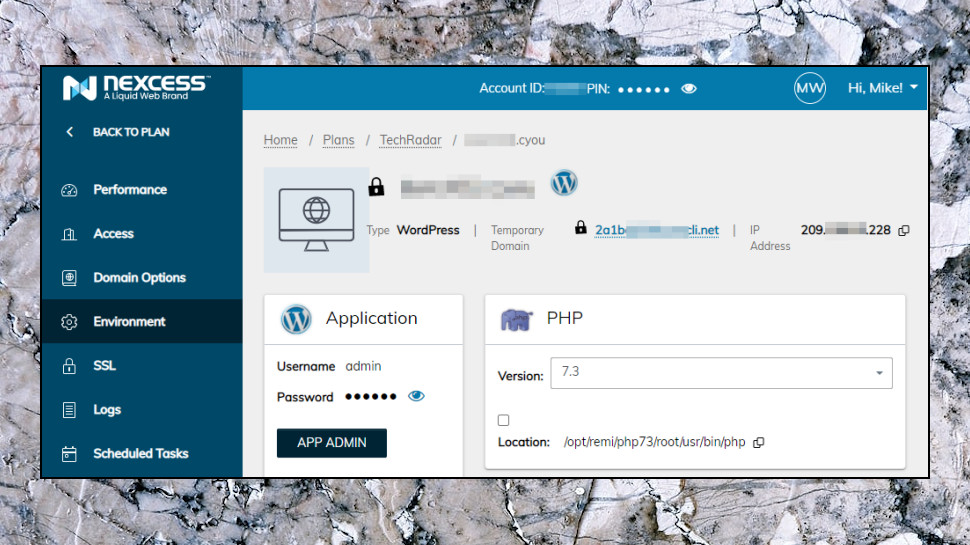
Account setup
Liquid Web hosting may be aimed at professional users, but the service website goes to unusual efforts to explain its product range.
Take your VPS control panel, for instance. Most providers offer cPanel, but there's a good chance you won't find that out until you sign up. Meanwhile, as we write, Liquid Web gives you a choice of three (cPanel, Plesk Web Pro and InterWorx), and the website gives you plenty of detail on how they compare.
If you're still unsure what you need, the Liquid Web site offers live chat where you can ask a sales agent for more information. We gave this a try and the agent quickly answered all our product and technical questions.
Once you're ready, choose a plan, hand over your contact details (name, email and physical address, phone number) and pay via card or PayPal. It's all very straightforward, and your account should be activated at speed.
We signed up for a managed WordPress plan, and within minutes a welcome email arrived including our login credentials, advice on migrating a previous website, and links for our account, the WordPress console, the billing area and support resources.
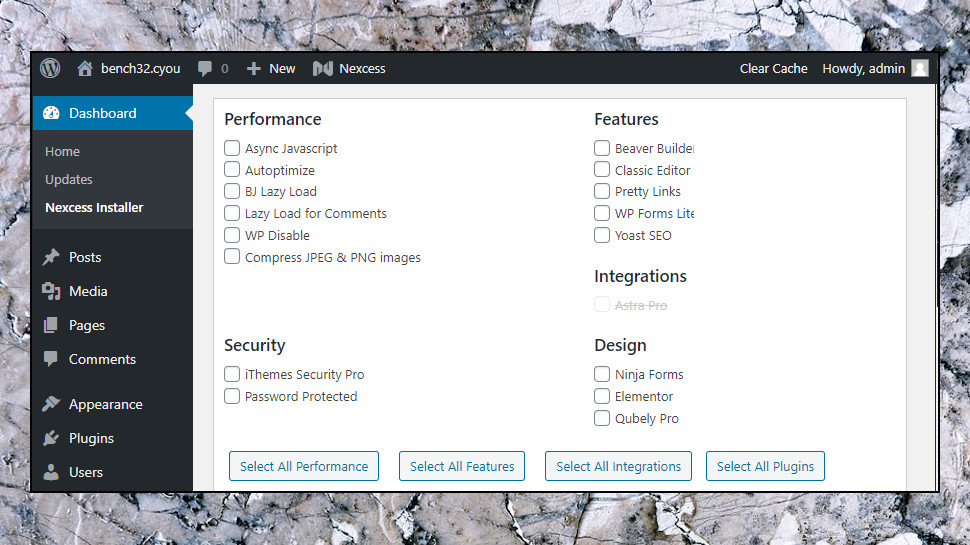
Creating a site
Liquid Web's plans provide various ways to build and manage your sites. Exactly what you'll see depends on the product you buy and how it's configured.
Opting for a managed WordPress account is the simplest option, as WordPress comes preinstalled. If you have an existing site elsewhere, good news: even Liquid Web's cheapest WordPress plans include a free migration where the company transfers the previous site for you.
Buy a VPS or a dedicated server with a control panel and you'll get access to Softaculous, an excellent platform which can automatically install WordPress and hundreds of other top apps.
Liquid Web doesn't include any website builders, but the free editions you get with some providers are generally very restricted, with limits of site size, the number of pages and more. You can install a site builder of your own, though, or use an online service like Wix or Weebly.
If you only have a simple static site, or you're setting something up yourself, SFTP and SSH access enables uploading and managing all the files on your server.
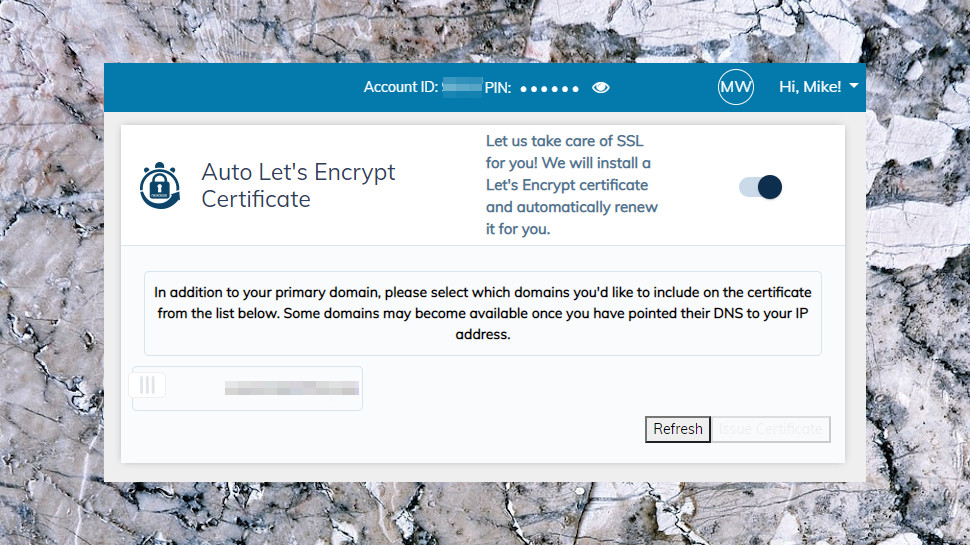
The management features you'll see depend on your plan and control panel. Ours had so many that we don't have the space to even outline them, but these are just some of the items on the sidebar: Performance (caching, CDN); Access (SSH, FTP); Environment (PHP version, WordPress update settings); SSL (auto-install a free certificate); MySQL (create and manage databases); Email (create and manage email accounts); backups, staging and more.
Smart touches include the Visual Comparison feature. Automatically updating WordPress plugins can break your site if there's a bug, so Liquid Web handles this very carefully: it makes a copy of your site, takes screenshots of key pages, performs the update and takes screenshots again. If anything has visually changed, the service raises an alert, and you're able to review the screenshots, and manually approve the update.
That's a major plus for busy sites which can't afford to crash because an update fails. It's also a feature you won't often see elsewhere; many WordPress plans either don't support automatic updates, handle WordPress updates only, or update some plugins but without significant (or maybe any) testing. If you're comparing Liquid Web with others, don't take an 'automatic updates' promise for granted: dig into the detail, find out exactly what the provider is doing.
Support
Checking out the support a web host offers can tell you a lot about the company, so it's wise to take a closer look before you buy.
Liquid Web's support website impressed us immediately with its depth and range. The opening pages clearly explained what was on offer, listed the support available with various levels of plans, provided a searchable knowledgebase crammed with tutorials and guides, and even pointed us to some useful custom tools (an SSL certificate checker, a DNS record viewer and more).
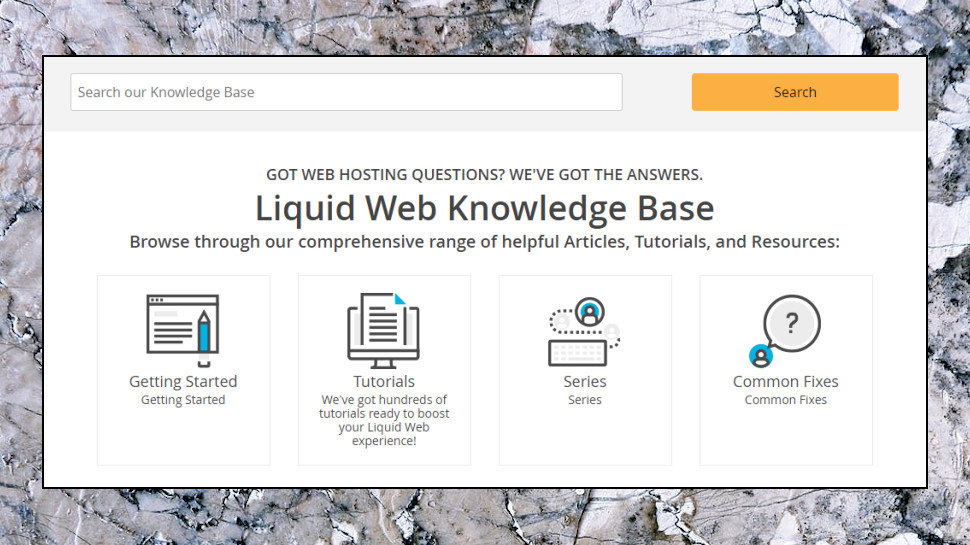
The knowledgebase organizes its articles into 4 categories: Getting Started, Tutorials, Series (more complex topics spread over several articles) and Common Fixes.
These aren't always well presented. The Common Fixes section has articles like 'How to Enable an EPEL repository' and 'How to Set Up Multiple SSLs on One IP With Nginx' on its front page, for instance; both may be good to know, but we doubt they're 'common fixes', even amongst advanced users.
For some reason, the knowledgebase displays hundreds of words of some of these articles, too, forcing you to scroll down to look for anything that might be useful. It would make much more sense to limit the summary to a couple of lines, enabling users to see more articles at a glance.
There are smarter ways to try and find the articles you need, including a search box and a blog-like tag cloud. Results don't always have the most likely useful articles at the top of the list, but this time they're summarized in a few lines, making it easy to scroll the list and find whatever you need.
We browsed the knowledgebase and found plenty of well-written content covering everything from the setup basics to helpful advice on topics from 'How to use Remote Desktop to transfer files to your Windows Server' to 'Using Stripe as a payment gateway in WooCommerce'.
If you can't find what you need, Liquid Web's support team is available 24/7 via live chat, telephone and email. There's no outsourcing support to the lowest bidder, either: the company has its own large team of Windows, Cisco and Red Hat Linux-certified technicians on hand to help you out.
It's not practical to reliably assess this level of professional support in a short-term review, but in our experience the Liquid Web team performs very well, showing a depth of knowledge which goes far beyond what you would see with budget hosting providers.
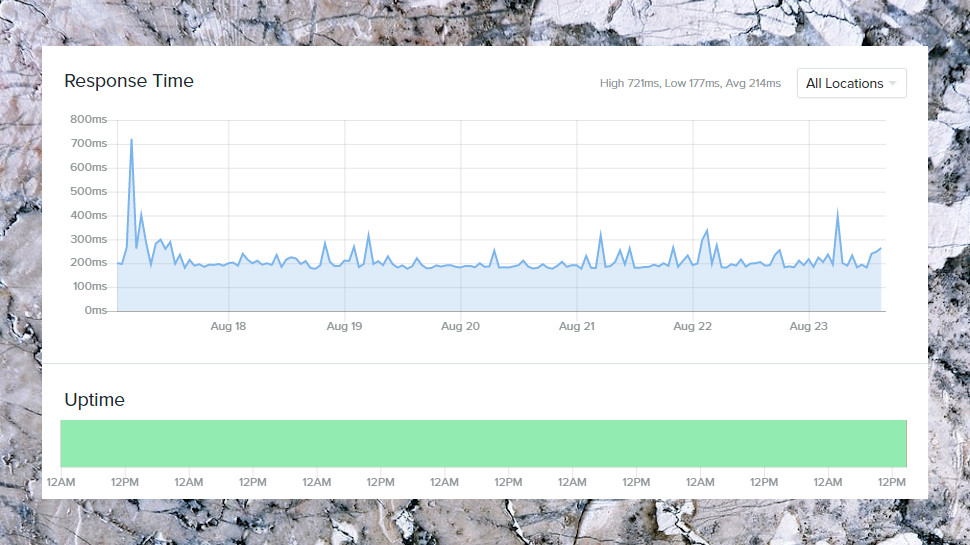
Performance
Reliability is a critical element of hosting, especially for professional users. If your site is down or a poor performer, that'll quickly get you a poor reputation with your visitors.
To measure reliability, we use Uptime.com to monitor a test site over a period of a week. Every five minutes, Uptime accesses a page on our site, then logs its success (or failure) and the server response time.
Liquid Web scored a perfect 100% uptime, without a single failure over our more than 2,000 checks. Average response time was excellent at 214ms (most shared hosting servers achieve closer to 300ms, some are 400ms and more.) Google's PageSpeed Insights analysis and Bitcatcha's server check also very positive results.
Consistency is important, and Liquid Web scores well here, too. We saw one significant blip of 721ms, but typical response times outperformed many competitors at 200-300ms, suggesting our site would deliver consistent and reliable performance over time.
Final verdict
Liquid Web hosting costs more than most, but you get more, too – powerful features, solid and reliable servers and excellent support available 24/7. If power is more important than price, the company needs to be on your hosting shortlist.
- Best overall web hosting services
- Best WordPress hosting providers
- Best cloud hosting providers
- Best Linux web hosting services
- Best e-commerce hosting
- Best dedicated server hosting
- Best small business web hosting
- Best Windows hosting services
- Best managed web hosting
- Best green web hosting
- Best business web hosting
- Best colocation hosting
- Best email hosting providers
- Best VPS hosting providers
- Best web hosting resellers
from TechRadar - All the latest technology news https://ift.tt/2qwNCuO
via IFTTT
0 التعليقات: